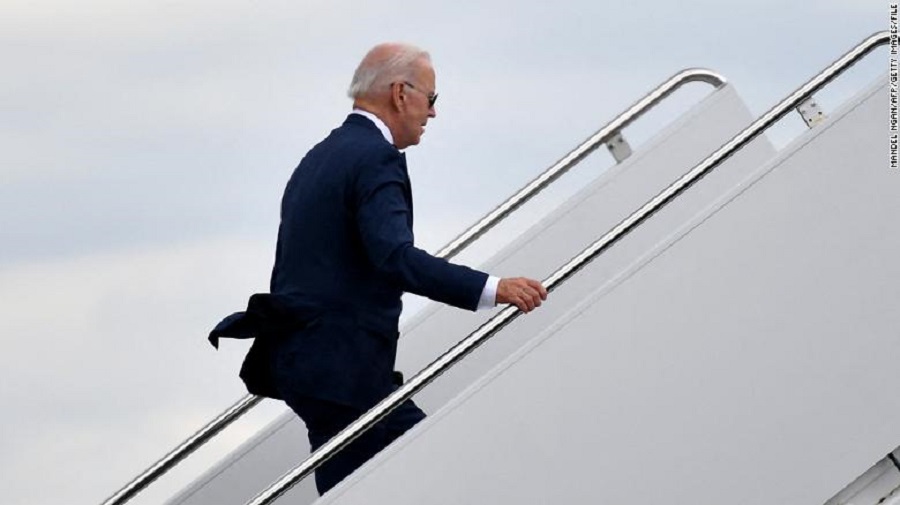
US President Joe Biden boards Air Force One before departing Piedmont Triad International Airport in Greensboro, North Carolina on April 14, 2022.
President Joe Biden will make his first trip to Asia as president next month, visiting South Korea and Japan from May 20 to May 24, White House officials told CNN, underscoring his commitment to the region even as international attention is directed toward the crisis in Ukraine.
Biden, the officials said, will hold bilateral meetings with his counterpart in each country: Korean President-elect Yoon Suk Yeol, who is set to be inaugurated on May 10, and Japanese Prime Minister Fumio Kishida. In Tokyo, Biden is also set to meet with the leaders of Japan, Australia and India, in a gathering of the Quad partnership that's been revitalized at his initiative.
The trip is meant "to further deepen ties between our governments, economies, and people," press secretary Jen Psaki said in a statement. "This trip will advance the Biden-Harris Administration's rock-solid commitment to a free and open Indo-Pacific and to U.S. treaty alliances with the Republic of Korea and Japan."
Looming over the trip will be a spate of weapons tests by North Korea, which have worried US officials and demonstrated the hermit kingdom's continued threats. The country's dictator, Kim Jong Un, vowed during a massive military parade this week to "strengthen and develop" his nuclear forces at the "highest possible" speed, offering a glimpse of his ambitions for the coming months.
The four-day trip to Asia comes at a critical moment in Biden's presidency, as he seeks to keep the US and its allies united against Russia's unprovoked war on Ukraine amid mounting civilian casualties and intensifying fighting. The conflict in Europe has been a consuming issue of the President's second year in office, with the US committing billions of dollars in aid for Ukraine and hitting Russia with a slew of economic sanctions. Amid Russia's attacks in Ukraine, Biden has stressed that he believes the US' alliances in the Indo-Pacific are key to upholding a "rules-based order" across the globe.
At the same time, the conflict has underscored the continued threats posed by historic foes like Russia, even as Biden works to recalibrate American foreign policy toward Asia in a bid to counter China's growing influence. Biden is the third consecutive US president to voice a desire to pivot toward the region, but the trip, coming 16 months into his presidency, is later than most presidents have visited Asia. Biden's travel has been hampered by the Covid-19 pandemic.
White House aides insist they are able to focus on Asia at the same time the world is consumed by the crisis in Ukraine. And officials say they have been pleasantly surprised by the willingness of US allies in Asia, including Japan and South Korea, in joining an international sanctions regime designed to crush Russia's economy. Japan and South Korea have also diverted some of their supplies of natural gas to Europe as it works to wean itself from Russian energy imports.
Biden spoke with Yoon, a conservative former prosecutor, on the phone last month after he was called the winner of the South Korean election to replace outgoing President Moon Jae In. During that call, the White House said at the time, the pair discussed, among other things, the threats posed by North Korea's nuclear and missile programs, and other global issues like Covid-19 and climate change.
North Korea, which Biden identified as his greatest foreign policy challenge early in his presidency, has resumed provocative weapons tests ahead of Yoon's inauguration. The Biden administration has sought to restart diplomacy with Pyongyang, but has received little response. Yoon, meanwhile, has vowed to harden South Korea's line against the North after Moon made attempts at cultivating diplomacy -- including helping then-President Donald Trump arrange a series of summits with Kim.
During Trump's final visit to Seoul as president, he made a detour to the demilitarized zone, where he shook hands with Kim and stepped over the line of demarcation into North Korea. Previous presidents have also paid visits to the highly fortified border area, but it wasn't clear whether Biden plans a similar stop.
Biden has already had multiple interactions with Kishida this year after the Prime Minister assumed office last fall. More recently, both leaders attended emergency summits in Brussels, Belgium, in March, convened amid Russia's attacks in Ukraine. Earlier that month, the four Quad leaders had held a call, during which they had agreed to meet in person in Tokyo later in the year.
Biden's visit to South Korea and Japan also comes as US officials are carefully watching China's actions related to the war in Ukraine. The Biden administration has repeatedly stressed that Beijing would face severe consequences if it were to help the Kremlin's efforts in Ukraine, and has sternly spoken out against Chinese efforts to help spread Russian propaganda and disinformation about the war.
The Asia trip will come days after Biden hosts the leaders of the Association of Southeast Asian Nations in Washington on May 12 and 13. In announcing that summit, White House press secretary Jen Psaki said the gathering would "demonstrate the United States' enduring commitment to ASEAN, recognizing its central role in delivering sustainable solutions to the region's most pressing challenges, and commemorate 45 years of US-ASEAN relations."













